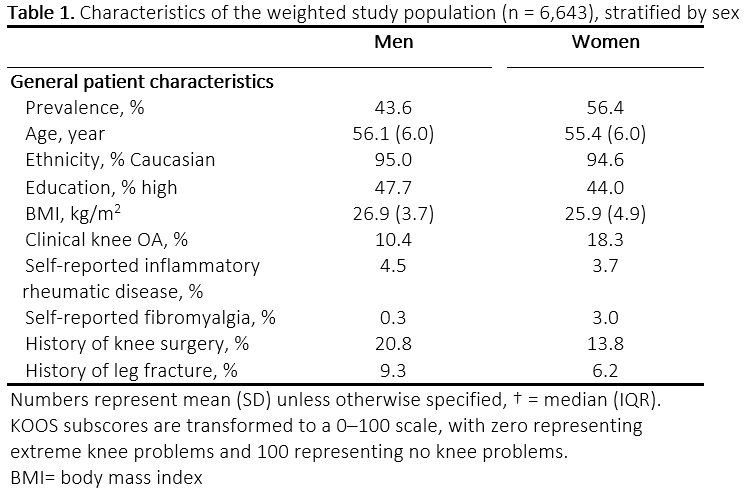Session Information
Session Type: Poster Session (Tuesday)
Session Time: 9:00AM-11:00AM
Background/Purpose: The Knee injury and Osteoarthritis Outcome Score (KOOS) questionnaire is a widely used patient-reported outcome tool, developed to evaluate short- and long-term knee symptoms and function. Previous studies evaluating knee complaints in the general population have shown that individuals in the general population do not report the best possible score on knee-specific questionnaires, stressing the need for benchmarks for adequate interpretation of these patient-reported scores. Therefore, we aimed to improve the interpretation of the KOOS by developing reference curves in a large population-based cohort.
Methods: We used cross-sectional data of middle-aged individuals from the Netherlands Epidemiology of Obesity study. We obtained questionnaires regarding demographic and clinical characteristics, including previous knee injuries and surgery, as well as the KOOS questionnaire. In addition, a standardized physical examination of the knee was performed, allowing the classification of participants with clinical knee osteoarthritis according to the ACR criteria, which were fulfilled in 15% of participants. Associations of demographic and clinical characteristics with KOOS were explored using ordered logistic regression and sex- and body mass index-specific reference curves were developed using quantile regression with fractional polynomials. Subsequently, KOOS scores of participants classified with knee osteoarthritis were compared to the reference curves.
Results: The NEO study population consisted of 6,643 participants (56.4% women) with a mean (SD) age of 55.7 (6.0) years. KOOS subscale scores (median; IQR) were high: pain (100; 94-100), symptoms (96; 86-100), ADL (100; 96-100), sport (100; 80-100), QOL (100; 75-100). Age was not independently associated with KOOS scores. We observed that scores of all KOOS subscales were lower in women compared to men, and in individuals with a higher body mass index. A history of leg fractures or knee surgery was not associated with KOOS scores. In contrast, knee osteoarthritis was associated with lower KOOS scores on all subscales. Plotting the scores of participants with knee OA shows that these scores are low relative to the general population.
Conclusion: In the middle-aged Dutch population KOOS subscale scores were generally high and were lower in women and in individuals with a higher body mass index. Reference curves developed in the general population can be used as benchmarks in research and clinical practice to aid the appropriate interpretation of scores from patients with knee complaints.
Boxplots represent scores of participants classified with knee osteoarthritis.
To cite this abstract in AMA style:
Loef M, Kroon F, Böhringer S, Rosendaal F, Kloppenburg M. Reference Curves for the Knee Injury and Osteoarthritis Outcome Score in the Middle-aged Dutch Population [abstract]. Arthritis Rheumatol. 2019; 71 (suppl 10). https://acrabstracts.org/abstract/reference-curves-for-the-knee-injury-and-osteoarthritis-outcome-score-in-the-middle-aged-dutch-population/. Accessed .« Back to 2019 ACR/ARP Annual Meeting
ACR Meeting Abstracts - https://acrabstracts.org/abstract/reference-curves-for-the-knee-injury-and-osteoarthritis-outcome-score-in-the-middle-aged-dutch-population/


